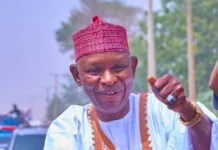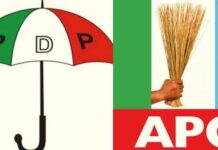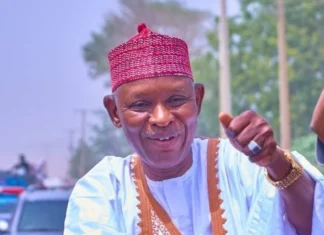By Chris Paul Otaigbe
Once the ring was declared opened in 1989, politicians swung into the game and swarmed Nigerians with political activities that defined the bottled energy of the nation’s paused democracy.
All the big political masquerades came out and Party politics jamboree and dance begun and the two political platforms provided for the show were Social Democratic Party (SDP) and the National Republican Convention (NRC).
The two political parties of the period, the SDP and NRC where formed partly to develop national consensus and consciousness and were both influenced by the military government since inception. The SDP was deemed a little to the left and NRC, a little to the right. Both parties encompassed different personalities with varying ideologies and reputation for personal philanthropy and according to some members, held a self-imposed logic of internal division.
They had been formed and fashioned after the American Democratic and Republican Parties.
The nation, during her third republic, witnessed broadly spaced elections and transitional democratic government in 598 local governments in 1991, in the state assembly and government houses 1992, in the federal legislature, also, in 1992.
The presidency was however, excluded, thus creating a diarchical system of government with military and civilian leaders. Besides being a transitional system, it was also designed to favor so-called new breed politicians.
Unknown to the Players and the nation, the Military was conducting an experiment designed to determine and direct its entry into the fray and more importantly, its continued control of power and more desirably, its continued control of government.
This was reflected in its constant interference in a political process that already had promise and potential that had clearly showed its capacity to manage itself without support or supervision from the military government. Yet, the Ibrahim Babangida-led junta kept up its interference under the guise of intervention to safeguard and midwife the process.
Its prime motive was, actually, to seek the submission of various factions within the party to provide support for their impositions. Among the various military interventions was the cancellation of polls including a presidential election in 1992. The unlucky presidential hopefuls in 1992, were Yar’Adua, head of the Peoples Front Coalition in SDP, Olu Falae, (from the People Solidarity Party coalition in SDP), Adamu Ciroma and Umaru Shinkafi, the latter two from the National Republican Convention (NRC). The presidential system then was a homegrown nomination process though inspired by the American nomination system drawn over a few weeks.
After the cancellation of the 1992 presidential polls, different groups within the parties threw accusations against each other for the cancellation: Shehu Yar’Adua, a presidential aspirant, for an example, felt the chairman of the party, Baba Gana Kingibe presented a report to President Babangida on the election which helped in the cancellation, Kingibe also earned the wrath of some disqualified governorship and presidential candidates who were later to play a part in his electoral loss at the SDP primaries in 1993.
Kingibe’s betrayal of the political class had won him the confidence of the military establishment, a goodwill that would later work for him in the later months and years the military remained in power.
In December 1992, new entrants for a new presidential poll began making their names known, among them was Moshood Abiola from Ogun State and Baba Gana Kingibe from Borno State both members of SDP.
Sequel to the cancellation of the 1992 presidential polls, a new presidential calendar was released. The two political parties were advised by the Federal Military Government to use the Option A4 system which resulted in the emergence of 30 presidential nominations in both parties each representing a state in the federation.
However, in the SDP, the fight was between, Abiola, Baba Gana Kingibe and Abubakar Atiku.
The Party’s presidential primaries was held in Jos in March 1993. The major contenders were M.K.O. Abiola, a wealthy businessman and former business associate of banned presidential candidate, Shehu Yar’Adua and Baba Gana Kingibe, former party chairman and talented manager who controlled a large share of SDP governors and hoping to reap the influence of any good will generated while he was party chairman.
Representing the Yar’Adua faction and hoping to reap rewards from drawing votes from the two candidates and strengthening his faction, the third contender was Abubakar Atiku. He was speculated to benefit from a disqualification of the leading candidates.
Initially, Abiola played a minor role in his party, presenting to party members the benefits of his entry as that of an individual who was known as a politician within their ranks but his candidacy may gain sympathy with the large number of electorate who, like him, were not registered with both parties and a shared independent views.
He lobbied many factions within the party both at the state and national levels. In Lagos, he held talks with the Sarumi and Jakande group, in Oyo, the Ladoja and Adedibu groups and in Kano, the Magaji Abdullahi and Abubakar Rimi groups.
The SDP presidential primary that took place in Jos showcased the various party bosses, with the Yar’Adua group stationed at Yahaya Kwande’s residence, the Olu Falae and Rimi group, the SDP governors behind Kingibe and also the Arthur Nzeribe group.
After negotiations and votes had been done, Abiola came out on top defeating Kingibe. A Yoruba Muslim, Abiola chose Kingibe a Northern Muslim as his running mate for the genaral election.
Abiola assembled a campaign organization headed by Jonathan Zwingina and made use of the broken Olu Falae campaign machinery. His opponent was another wealthy businessman from Kano, Bashir Tofa. However, as pre-election campaigns progressed, Abiola’s personality, a combination of friendly countenance and warm mien was an attractive asset in what became a popular campaign.
One of the enduring campaign jingles of the Social Democratic Party (SDP), under which Moshood Kashimawo Abiola contested and won the presidency in 1993, was: “Nigeria is on the march again,” which became a hit with Nigerians. MKO’s campaign was weaved around the story line that Nigeria was on the march again to greatness.
And that story was believable, because of his own rags to riches story, extraordinary philanthropy and visibility across the length and breadth of Nigeria.
The campaigns both parties ran were robust as they traversed the length and breadth of the country carrying Nigerians along. It was a jamboree and celebration of Nigeria’s anticipated return to democracy.
The campaign was so engaging that both candidates had good standing in the minds of their bases in the different parts of the country. The South, especially the South West, had already filed behind Abiola, while a larger part of the North had Tofa as their candidate. Predictably, both candidates’ poll rating profile showed that their electorate support base had the ethnic coloration that characterized Nigeria’s politics.
However, the Presidential Debate, the very first ever nationwide television debate (between the main presidential candidates), held in Nigeria’s political history played a big role in swaying the eventual votes for the MKO. It was that televised debate between both Presidential candidates that sold the business mogul from the South that bought over some liberal Northern voters.
During the presidential campaign of 1993, an association financed by Arthur Nzeribe known as ABN or the Association for Better Nigeria watched the campaigns from the sidelines while devising ways to scuttle the election.
Something strange happened very close to the June 12 election; a court order was given by Justice Bassey Ikpeme and her judgement was crystal clear ‘don’t conduct elections’, she said.
Prof. Humphrey Nwosu, the National Election Commission (NEC) Chairman was alone in the commission when the court order came as all the national commissioners had gone into the field to supervise and monitor the elections, hence he could not call a meeting of his commissioners to take a decision. He was left alone with the secretary of the commission, Alhaji Umar and the Director of Legal Services, Buhari Bello. “It was quite a problem what to do, we couldn’t summon the commission.” said Prof. Nwosu.
But he took some initiatives and courageous steps designed to make sure that the expectations of Nigerians were met. Nigerians wanted the elections. He wanted the election. But some Nigerians didn’t want the elections to hold. They did everything to prevent it from holding.
The NEC Chairman defied the Order and went ahead with the decision to hold the elections and his commission stuck to its rules of engagement at election.
The elections were conducted, but as they were collating the results, another bombshell struck from the judiciary;
“stop announcing the results of the elections”. There were also counter injunctions; some asked Nwosu to ‘announce’ some said ‘don’t’.”
Now that the most important task had been done, what was left was to release the results and the commission set about doing just that, while at the same time a decision was taken to challenge the order of the Abuja High Court stopping the election, because the commission felt the Court had no business stopping the elections. The NEC then went to the Kaduna Court of Appeal for that order to be vacated.
About 14 million Nigerians voted in the election monitored and endorsed by over 3,000 election observers from various parts of Nigeria and the international community and was viewed as credible.
Perhaps it would have been vacated. NEC’s Director of Legal Services challenged the order on behalf of the commission and the court directed that there should be accelerated hearing on June 25. Chief Moshood Abiola, presidential candidate of the Social Democratic Party, was there. His lawyer, G.O.K Ajayi, was represented.
Alhaji Bashir Tofa of the National Republican Convention NRC, was represented. Unfortunately, even though the hearing was scheduled for 25th of June, NEC was dissolved on the 23rd of June.
Prof. Humphrey Nwosu said “It was not a question that one was afraid. What the Appeal Court would have done was allow NEC to conclude its job because no court had the right to stop us.”
In the final analysis, the bravery and patriotism of Prof. Humphrey Nwosu was obviously the driver of the vehicle that delivered the election that we now celebrate as June 12. He dared the Military, dared an illegal interference of the Judiciary at the risk to his life, family and livelihood to ensure the right thing was done at a time the country needed courage and loyalty to her cause and course.
He had a choice to take money as many in his position, past and present, would have done to save their heads, make money for their family and generations. But he rejected such a tempting offer. He could have been scared enough to be cowed by threats from his employer, the Federal Military Government, and sundry enemies of the State. At least he has a right to save his life and that of his family.
But he chose the honourable path to give his nation, the most peaceful, the freest, fairest and most celebrated election till date.
Without him, there would have been no MKO Abiola to be celebrated. Abiola would just have ended up like the candidates who were banned by his own friend, IBB, before the June 12 election. MKO would only have gone down in history as, perhaps, the most remembered of the candidates, who would have justifiably remained disgruntled for being deprived of their rights to contest at the highest office in the Land.
Indeed, Prof. Nwosu is the unsung and real hero of the June 12 saga and therefore the man that deserves to be celebrated.











